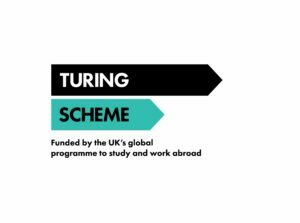Applications to study Study Abroad 2025/6 are now closed. The deadline to apply was Wednesday 15 January 2025 at 15:00 (UK Time).
Study Abroad at the University of Malaysia
If you study in the Henley Business School. School of Construction Management or in the School of Psychology, it might be possible to study at the University of Reading Malaysia (UoRM). Please see our UoRM webpage to see if this option is available to you.
The ‘Expression of Interest’ to study at the University of Reading Malaysia (UoRM) is open until Wednesday 12 March 2025 (23:59 UK Time). Please read the guide below.
There is also a new pre-application unit in Blackboard which aims to help you through the decision making process. We strongly encourage students to complete this before applying to study abroad.

Curious?
Submit an Expression of Interest to find out about what might be available!
Application Process
The Study Abroad application is a straightforward 4-step process.
Applications must be submitted the academic year prior to the one in which you wish to be abroad.
Make sure you take a look at the things to consider below for you start!
1. Fact Finding
- Check what summer, semester or full year study abroad opportunities are available within your subject area.
- Speak with your subject Study Abroad Coordinator and / or the Study Abroad Office to find out more.
- Carefully research possible study abroad or summer school destinations and work out what and where you would like to study. The ‘Things to Consider’ section below might help you with this!
- Review the Funding page to learn what financial support might be available to you.
- Review your financial situation using the suggested Study Abroad Budget Calculator (NB: You will need Microsoft Excel or equivalent software capable of opening .xlsx files)
- Attend study abroad presentations and sessions to gain more information and ask questions.
- Read about and listen to other students’ experiences.
2. Apply Online
Applications for 2025/26 are now closed, with the exception of studying at the University of Reading Malaysia.
Please contact studyabroad@reading.ac.uk if you have any questions regarding this.
3. Selection & Notification of Decision
Once the application deadline has passed, the Study Abroad Office will liaise with Study Abroad Coordinator(s) and partner institutions to negotiate study abroad places.
After this, decisions will be made and places will be allocated to applicants. We aim to notify students of decisions by late February / early March 2025.
Please remember that we cannot guarantee any student the opportunity to study abroad or a particular institution or country.
Students will be given a short turnaround time to accept their offer to study abroad, and the Study Abroad Office will then nominate you as the selected applicant(s) for will need to apply to the partner institution thereafter.
Selection Criteria for Study Abroad
All applicants must be in good academic and behavioural standing to be considered.
For subject-owned partnerships, the selection criteria is set by the academic School / Department.
For university-wide partnerships, the following factors will be considered in the decision-making process, especially if there are more applicants than places:
- Availability / capacity constraints at the partner institution.
- Academic performance (i.e., average grade of 55% or above at time of application or meets partner’s requirements – Part 1 applicants based on submodular grades; Part 2 applicants based on Part 1 grades)
- Duration of Study Abroad placement.
- Spread of subject backgrounds among applicants
- Study Abroad Coordinator comments
- Personal statement
Selection Criteria for Summer Schools
The following factors will be considered in the decision-making process:
- Academic performance (i.e., average grade of 55% or above at time of application – Part 1 applicants based on submodular grades; Part 2 applicants based on Part 1 grades)
- Students who have not participated (or are not due to participate) in study abroad or summer schools previously
- Students from subject areas where Study Abroad is not available .
- Students, from the following groups who:
- low-income backgrounds.
- are care givers, care-leavers or care-experienced.
- have a recognised disability.
- identify as an ethnic minority.
- A fair spread of participants across subject areas (unless summer school is subject specific)
- Study Abroad Coordinator comments
- Personal statement
4. Complete External Application Forms for Host Institution
Once you have been allocated a place to study abroad, you will then need to complete your allocated host institution’s external application procedures.
The partner is likely to send you the application details direct, and the Study Abroad Office and or your Study Abroad Coordinator can provide you with support to complete. Further details are provided you have formally accepted your offer to study abroad.
All overseas travel is subject to the laws and immigration rules of the jurisdiction to which you are travelling. If you believe you may be prevented from travelling to a particular country, please notify the Study Abroad Office as soon as possible.
Things to Consider Before You Apply
Studying abroad is a big commitment, but there a lot of benefits in doing so. Making the commitment to study abroad can often be the hardest decision of all, so understanding why you want to study abroad and what you want to gain from the experience will help you at every stage of the process.
A Pre-application unit will soon be made available in Blackboard to help you through the decision-making process – details to follow soon. However, you can also use the information below to help you.
1. Why do you want to Study Abroad?
There are no right or wrong reasons. It is what you want that is most important. For example, is it a love of a country or culture? An opportunity to learn new things? A chance to travel? Do you want to challenge yourself?
Weigh up the pros and cons of living and studying in another country.
Knowing why it is that you want to study abroad will help in your decision making processes, as well as help you overcome any obstacles that you may face.
2. What is most important to you?
Are academic interests more important than the overall experience? Do you want to go to somewhere familiar, or new? Is your potential destination more important than the range of modules available? Understanding this will help you work out which of the available opportunities is right for you.
However, you will need to study whilst abroad no matter where you choose. Therefore please ensure that any institutions you are interested in can meet any academic requirements.
3. What are your specific academic interests?
Each university specialises in something different, and you must make sure that the universities you select on your application form offer the subjects or topics you need to study or are interested in. Each partner website should provide you with information about the range of modules available.
We recommend the Study Abroad web-pages of each partner institution will be the best place to start your investigations as often they will have study abroad specific information easily available.
4. What type of experience do you want?
Do you want to live on campus or have a big city experience? Do you prefer to be part of a large or more intimate student community? How important is to you that you live in on-campus halls? Do you want to live in a country where you speak the language, or are you comfortable living in a totally different culture? Knowing this will really help you decide where you want to go.
5. What can you afford?
Whilst there might be funding available to contribute towards the costs of studying abroad, it is still a financial investment. Some places are more expensive to live in than others, and travel costs can vary. Wherever you go, there will be loads of new and fun opportunities available to you (including travel). Therefore please plan non-academic activities into your budget, as well as standard day-to-day living. The Study Abroad Budget Calculator might be able to help you.
6. Do you need additional support?
We want as many students from all backgrounds and abilities to be able to study abroad. However, we realise that if you need additional support (in whatever capacity) here at Reading then you could have concerns as to whether study abroad is right for you. We recommend that, where appropriate, you discuss your concerns either with the Study Abroad Office, or the team at the University of Reading that provides you with assistance regarding your additional support. They can offer you impartial guidance and help.
If you are a student with a disability, please see the support and disability support pages.
7. How flexible are you willing to be?
You may have your heart set on a particular destination, but we recommend being open-minded as to what is available. Many students end up studying somewhere different to their initial first choice. Often after researching destinations and costs, and thinking about what it is they are really seeking from a study abroad experience, students realise that a different destination may be better for them. The world is a big place – there are excellent opportunities available to you everywhere.
8. What do your parents / guardians / loved-ones think?
Don’t exclude those closest to you from the decision making process. Parents and guardians will be able to offer you advice and often they really want to help you – emotionally as well as financially!
They are likely to want to feel part of the process, as you going abroad will also affect them. In most cases you have little to lose and loads to gain by talking it through with them.
Frequently Asked Questions about applying to Study Abroad
Frequently Asked Questions
Where can I find the application link?
Applications for 2025/6 are now closed, but the application link for study abroad was in the Study Abroad Application Guide 2025/26 .
If interested in studying abroad at the University of Reading Malaysia, you will be able to do so via RISIS – details to be published soon.
When will I hear back regarding my application?
The Study Abroad Office will only begin reviewing applications once the deadline has passed. Students will normally be notified by email of the outcome of their application in late February / early March 2025, or informed in advance if application outcomes will be in advance of this date.
Can I apply for both semester/year-long study abroad and a summer school?
You can, but it does not mean that you can do both. The application form will give you an option to apply for both activities. However, applicants will normally only be able to be allocated to participate in either a summer school or an exchange placement (semester or year-long) in this application round. You will be asked whether semester / yearlong or summer school is your preference.
Can I apply for both a worldwide partner and the University of Reading Malaysia?
Yes. Submit both of the following:
- Application to Study Abroad in 2025/26.
- Application through the UoRM Expression of Interest Tool on RISIS.
When completing the Application to Study Abroad in 2025/26, you will be asked to list up to five partner institutions . Make sure you include the University of Reading Malaysia as one of the institutions in that list.
Will I improve my chances of getting my preferred choice(s) if I select less than 5 institutions?
No. If you select fewer possible options, you will reduce the chances of being able to study abroad. Most years students apply for only 1 or 2 institutions believing that by having selected fewer options that they will have to be allocated one of them, and they miss out on studying abroad. However, do not list institutions where you would not want to study.
If I change my 3-year degree now to a 4-year degree with Study Abroad, will this improve my chances of being allocated a place?
No. It will not impact the allocation making process in any way. Being on the 4-year programme does not guarantee you a place to study abroad.
How do I know when and where I might be able to go abroad?
You can find a list of eligible destinations and study abroad durations on the Where? page.
- Enter your subject area. This will bring up a list of eligible destinations.
- Select ‘Find out more’ next to any institution.
- Scroll down and select ‘When can you study abroad?’. This will tell you when students of your degree programme are permitted to go overseas.
My subject does not list a university where I want to study abroad. What should I do?
If a partner institution is not listed as an available option for your subject area it means you cannot study abroad at that institution. If you select it in your application it will be a wasted selection.
How do you decide who gets to study abroad or participate in a summer school?
You can find selection criteria on the main Apply page under ‘Application Process > 3. Selection & Notification of Decision > Selection Criteria for Study Abroad/Summer Schools’.
If I do not get my first choice institution can I be put on a waiting list for that institution if I accept an offer for another university ?
No.
What happens if I fail a module(s) and need to resit in August 2025? Can I still study abroad?
The option to study abroad is dependent on you being in good academic standing and registered as a full-time student at the University of Reading at the time the mobility takes place.
If you have failed a module / modules, you might not be able to academically progress to the next academic year if you do not resit the module / modules. In such a case you might not be considered in good academic standing and your Department / School could remove permission to study abroad if you have not successfully completed your current academic year of studies.
Some partner institution’s academic calendars might start before the planned resits dates in August 2025 (e.g., Australia, New Zealand, USA etc), which could prove problematic.
If this situation arises, you need to discuss options with your Study Abroad Coordinator and Academic Tutor at the earliest opportunity. Any costs incurred by this point will be borne entirely by the you the participant, and not by the University of Reading.





